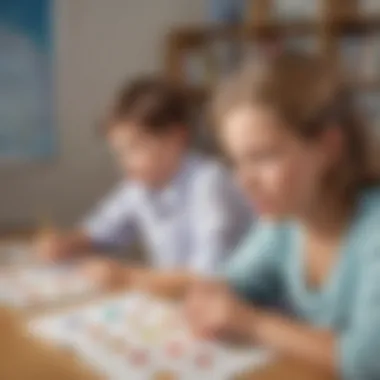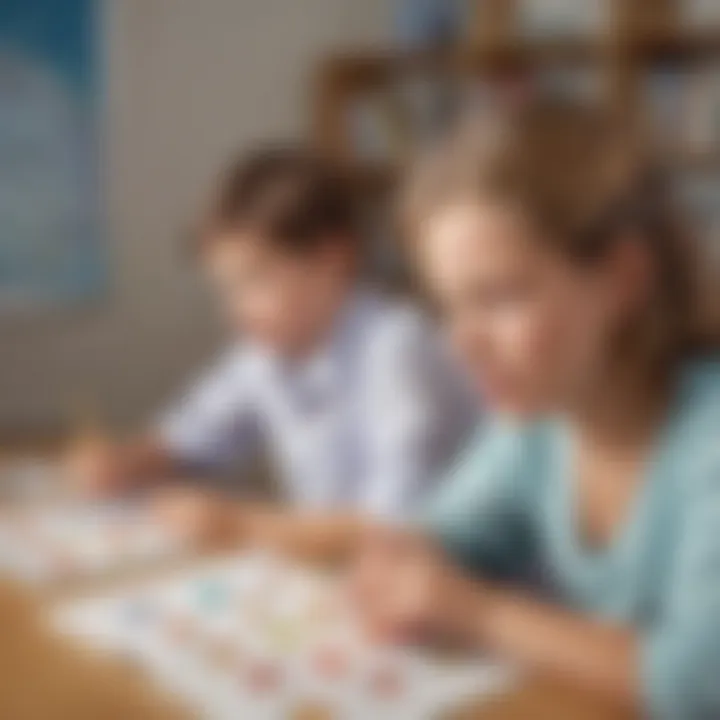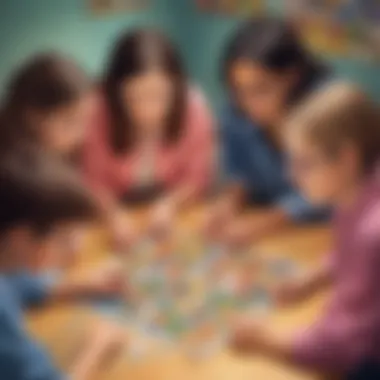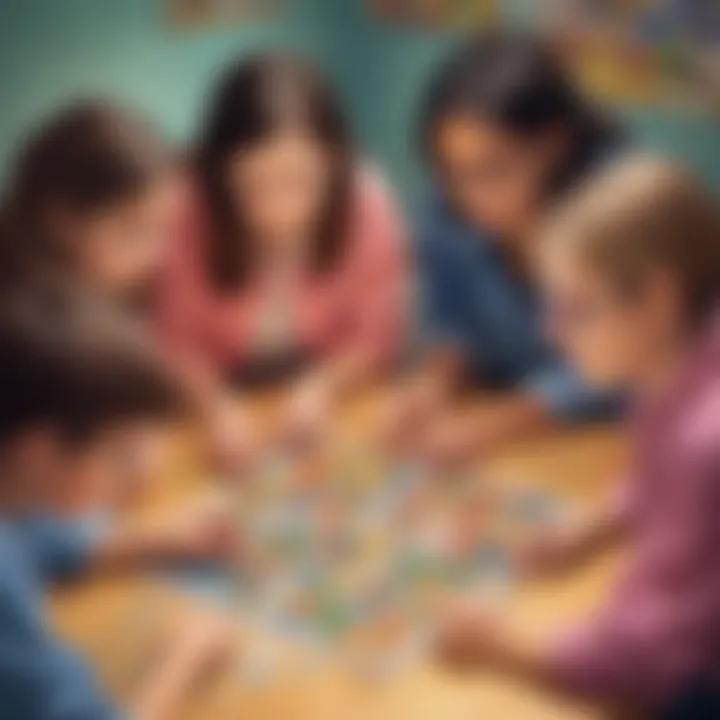Brain Games for Concentration: Boosting Focus in Kids


Intro
In today’s fast-paced world, the ability to concentrate has become a vital skill, especially for young learners. The myriad of distractions they face can be overwhelming. As caregivers and educators, it’s essential to guide children towards the right tools for honing their focus. Enter brain games—fun, engaging activities that not only entertain but also improve concentration.
This article will examine various brain games specifically designed for elementary school children, illuminating their cognitive benefits while exploring how these games can be seamlessly woven into daily routines. Through this exploration, parents and teachers will gain valuable insights into the significance of concentration in the learning process and discover inventive ways to fast-track children’s focus and creativity.
We will delve into creative activities with easy craft ideas, present exciting quizzes that challenge and inspire, and highlight fact-based articles that provide a treasure trove of information—all while ensuring each aspect is suited for young minds. Let’s venture into these engaging strategies that promise to transform learning into an exhilarating adventure!
Understanding Concentration
Concentration is a cornerstone for effective learning and development, especially in young minds. For elementary school children, the ability to focus is crucial, setting the stage for academic success and the development of essential life skills. This section helps illuminate how focus plays a pivotal role in children's education and overall well-being.
Definition and Importance
At its core, concentration is the mental effort involved in focusing one's attention on a specific task or subject. It’s like tuning into a favorite radio station without getting distracted by the static from other channels. Its importance cannot be overstated; concentration allows children to absorb information, participate in classroom discussions, and complete tasks efficiently.
A strong grasp of concentration leads to better academic performance. Studies have shown that when children practice focused attention, they not only retain information better but also develop critical thinking skills. Moreover, as they learn to concentrate, they become better at managing their time and their commitments, leading to reduced stress and increased satisfaction in their work. As such, understanding concentration helps both parents and educators cultivate environments that promote enhanced cognitive abilities.
Challenges Children Face
While fostering concentration is key, many children encounter obstacles that can impede their ability to focus. For one, the digital age offers a barrage of distractions. Be it notifications from smartphones or the allure of video games, children often find themselves battling against these shiny temptations, making it tough to stay on task.
Moreover, developmental factors play a significant role. Young children naturally have shorter attention spans, which can affect their learning processes. They might hop from task to task, resembling a butterfly flitting from flower to flower. This can lead to frustration, both for the child and the caregivers.
Additionally, emotional factors cannot be ignored. Anxiety, low self-esteem, or even fatigue can significantly impact a child’s ability to concentrate. A child who is worried about a test or feeling tired after playing too hard may find it challenging to maintain focus during a lesson. Recognizing these challenges is the first step for parents and educators to create supportive environments tailored to the needs of young learners.
"Understanding the dynamics of concentration in children is crucial for tailoring educational practices that meet their unique needs."
In summary, concentration is not just an academic skill; it extends into various facets of life, shaping a child's ability to learn, interact, and thrive. Understanding its definition and the challenges children face can help guide the implementation of effective strategies—namely through engaging brain games aimed at enhancing focus.
The Role of Brain Games
When it comes to enhancing concentration among elementary school children, the significance of brain games cannot be overstated. These games serve not merely as sources of entertainment but as powerful tools that can elevate cognitive abilities and nurture focus. The daily hustle and bustle in children’s lives often leads to distraction and a lack of persistence in tasks. Integrating brain games into their routine can help get their gears turning and keep distractions at bay.
What Are Brain Games?
Brain games are specially designed activities that challenge a child's mental capacity through engaging and stimulating tasks. Unlike standard gameplay, which may emphasize mere luck or speed, brain games require careful consideration and problem-solving skills. They can be as simple as a crossword puzzle or as complex as a strategic board game like Chess.
Here's a quick outline of the different types of brain games:
- Puzzle Games: These often involve logical reasoning, such as Sudoku or jigsaw puzzles, where children must piece together solutions or images while sharpening their problem-solving abilities.
- Memory Games: Involving cards or sequences, these games train children to recall information, boosting their memory capacity.
- Strategy Games: Games like Settlers of Catan or checkers that require planning ahead teach kids to manage resources and think critically.
- Simple Word Games: Engaging in word searches or Scrabble can enhance vocabulary while making learning enjoyable.
Each category targets different cognitive skills, helping kids to sharpen various aspects of their focus and mental acuity.
How Brain Games Promote Focus
The crux of concentration lies in one’s ability to maintain attention on a task for an extended period. Brain games provide an excellent avenue for cultivating this skill. Here's how they work their magic:
- Engagement: When children play brain games, they are actively involved, requiring mental investment. This participation naturally fosters concentration levels, preventing the mind from wandering.
- Incremental Challenges: As most brain games increase in difficulty, they teach children to handle frustration and setbacks. This process is crucial for developing perseverance, as they learn to focus on long-term goals rather than immediate rewards.
- Routine and Repetition: Regularly engaging in these games helps form habits. Once children get used to focusing while playing, they can transfer that skill to other areas like homework or chores.
- Goal Setting: Many brain games infuse a sense of achievement when a level is completed or a puzzle solved. This success can motivate kids to set their own concentration-related goals outside of their game time.
"By integrating brain games into regular play, parents can help their children hone their ability to concentrate, thereby enhancing their overall learning experience".
Types of Brain Games
When it comes to enhancing concentration in elementary school children, understanding the different types of brain games can make a world of difference. Each category offers unique attributes that engage various cognitive skills. By exploring the nuances of these games, parents and educators can select the most suitable activities for the children in their care, encouraging both focus and enjoyment.
Puzzle Games
Puzzle games are like those intriguing pieces of a jigsaw you find buried in a thrift store; they challenge a child's ability to fit ideas together in unexpected ways. These games develop critical thinking and spatial awareness. Whether it’s traditional puzzles or digital ones available on various platforms, the invitation to solve problems draws in even the most hesitant participants.
Moreover, these activities can range in difficulty, catering to diverse skill levels. Younger children might enjoy simple jigsaw puzzles featuring their favorite cartoon characters, while older kids could tackle more intricate logic puzzles that require deeper analytical skills.
"The joy in solving a puzzle lies not only in the end result but the journey it takes to get there—much like learning itself!"


Memory Games
Memory games tap into the essential skill of recall, essential for school success and life in general. These games can vary from card-matching games to digital apps that test short-term memory through engaging visuals and exciting sounds. The core principle is simple: improve your ability to remember shapes, colors, and positions.
Playing memory games regularly can lead to better results in the classroom. Children learn to focus on details, enhancing their ability to retain information over time. Additionally, these games sharpen cognitive pathways, which can also help in other subjects, like math and science.
Strategy Games
Strategy games open the door to a world where choices matter. They sharpen decision-making skills and require children to think several steps ahead. Games such as chess or checkers are two classic examples that teach not just how to make a move but how to anticipate an opponent's strategies, fostering critical and independent thinking.
By engaging with these types of games, children learn the importance of planning, resource management, and adaptability—skills that they can apply in everyday life, from organizing their homework to deciding how to spend their allowances.
Simple Word Games
Simple word games are delightful ways to blend learning with fun. They include classic games like Scrabble and Boggle and can also extend to online platforms where vocabulary tests and spelling challenges abound. These games are not just enjoyable; they improve language skills and expand vocabulary in a natural, engaging way.
The beauty of word games is that they can be played independently or in groups. This flexibility allows for social interaction, which is vital as children develop teamwork skills. They provide a platform for conversation, creativity, and exploration of language while boosting concentration and focus over time.
In summary, exploring each type of brain game presents a rich palette of opportunities to improve concentration, memory, and problem-solving skills for elementary school children. The blend of fun and learning ensures that kids are actively engaged while developing crucial cognitive abilities.
Benefits of Playing Brain Games
Playing brain games can be a blast and has real advantages that go beyond just passing the time. For children, these games serve as more than mere entertainment; they are tools that promote mental agility and overall cognitive health. In a world where distractions are a dime a dozen, honing focus can make a world of difference in learning and daily life. So, let’s break down the nitty-gritty of how brain games can mold a child’s cognitive landscape.
Cognitive Development
Cognitive development is like the building blocks of a child’s mind. It’s the process by which children learn to think, learn, reason, and understand their environment. Brain games often engage various areas of the brain, enhancing skills like attention span, problem-solving, and memory. When kids engage in activities such as puzzles or logic games, they are essentially doing mental gymnastics. This exercise strengthens neural connections and can lead to improved cognitive functioning over time.
"Playing is the highest form of research." - Albert Einstein
Engaging with brain games not only stimulates critical thinking but also encourages curiosity. Children are natural explorers, and these games often spark a desire to learn more, pushing them to dig deeper into subjects of interest. As they tackle challenges within these games, they are developing skills that will serve them well throughout their lives.
Improved Memory Skills
Memory is crucial—it’s how we store and retrieve information. Brain games specifically designed to enhance memory skills can have significant impacts on a child's ability to remember facts, experiences, and skills.
Games like memory matching or card games force players to remember locations of items, which can translate into better retention of information in school.
- Fact-Recall Games: These can help in learning new vocabulary or math formulas.
- Type of Visualization: Many memory games boost visual memory, teaching children to create mental images that make recalling easier.
- Engagement Elements: Games that involve storytelling can aid in memorizing sequences or facts, allowing for more contextual learning.
When kids work through these memory games, they're also learning strategies to enhance their recall, which can be applied in academic settings.
Enhancing Problem-Solving Abilities
Every time a child sits down to figure out a tricky puzzle, they are stepping into the world of problem-solving. Brain games teach kids how to approach challenges systematically and outthink obstacles, which are essential skills not just for school but for life.
- Analytical Thinking: Many brain games require assessing different strategies and outcomes, helping children to think critically.
- Collaborative Problem-Solving: Games can also introduce elements of teamwork. When kids play together, they learn to share ideas and solutions with peers.
- Real-World Application: The ability to solve problems creatively in games is a transferable skill, helping them face real-life challenges—whether it’s sorting out a disagreement with a friend or tackling a new math problem.
In essence, brain games serve as a practice ground for the mind, sharpening retention capacities, enhancing cognitive skills, and fostering collaboration. As these attributes develop, so too does a child’s confidence in their abilities—transforming challenges from daunting to manageable.
How to Choose the Right Brain Game
Selecting the most suitable brain game isn’t just a matter of picking any option off the shelf. It’s about identifying the right fit for a child’s unique needs, interests, and developmental stage. This choice can significantly influence the effectiveness of the game in enhancing concentration. Here, we delve into three pivotal considerations: age appropriateness, interests and engagement, and complexity and challenge level.
Age Appropriateness
When it comes to age appropriateness, there’s more involved than simply matching the game to a child’s age on the box. Each child matures at their own pace; what works for one may not resonate with another. Games designed for older children might overwhelm younger ones, while simpler games could bore older kids. Thus, it’s crucial to assess not just the age recommendation but the skills of the child. Age-specific games typically have content that aligns with cognitive functions and learning styles at that stage.
For example, games like Rush Hour can be great for tweens, as they engage critical thinking, while Zingo! suits younger children to build vocabulary skills. By respecting these nuances, parents can enhance engagement and make learning enjoyable.
Interests and Engagement
Engagement is key when it comes to concentration. Children are naturally drawn to games that spark their interests. For some, it might be colorful puzzles of animals, while others might prefer strategic board games involving adventure themes. Delving into a child’s hobbies can provide clues on what's likely to keep their attention.


Choosing games based on their interests not only makes the experience more enjoyable but also helps in reinforcing the learning objectives behind them. For instance, if a child is fascinated with dinosaurs, consider games like Dino Island, which combines learning elements with their favorite subject. Finding the intersection of interest and learning can heighten motivation.
Complexity and Challenge Level
Every child possesses a unique set of abilities, and thus the challenge level of the game should be carefully considered. A brain game should neither be too simplistic nor exceedingly complicated. If the game is too easy, boredom sets in quickly; too difficult, and frustration can derail any benefits derived from play.
A balanced approach to complexity is essential. Look for games that offer multiple levels of challenges or progressive difficulties. For example, Chess for Kids introduces rules gradually, allowing young players to build their skills without feeling overwhelmed. This layered approach keeps the brain engaged and encourages the child to strive for success gradually.
"The right brain game can transform learning from a tedious task into an exciting journey of discovery."
By thoughtfully considering these aspects—age appropriateness, interests and engagement, and complexity—parents and caregivers can effectively choose brain games that not only aim to enhance concentration but also cultivate a genuine appreciation for learning in their children.
Implementing Brain Games at Home
Integrating brain games into the home setting is an enriching opportunity to enhance concentration skills in elementary school children. By fostering a supportive environment, parents and caregivers can create a space where learning feels engaging. This deliberate act not only nurtures focus but also stitches cognitive development into the fabric of daily routines. Effective implementation boils down to a couple key considerations: consistency in engagement and the adaptability of games to fit various situations.
Creating a Game Routine
Establishing a fixed game routine can be a game-changer. Routines provide predictability, making children feel secure and more likely to participate. Allocating time each day—say, right after school or before bedtime—allows kids to wind down while sharpening their focus. But it doesn’t have to be a grueling schedule. Just fifteen to twenty minutes works wonders. A good start could be introducing games that correlate with their daily lessons or interests. For instance, if a child enjoys animals, a themed puzzle game about wildlife could enhance their enthusiasm while also fostering focus.
Additionally, balance is vital. It’s like pie: too much of one flavor can get old fast. Mixing different types of games—like puzzles, memory games, and board games—keeps it fresh. Consider implementing a reward system to motivate them, even if it’s as simple as earning stickers for every game played. This way, children not only engage in the games but also look forward to their time dedicated to play and learning.
Incorporating Games into Daily Activities
Integrating games into everyday tasks can effortlessly build concentration without making it feel like an obligation. For instance, ask them to create a quick spelling game about groceries while making a shopping list or turn tidying up into a time-based memory game where they remember where toys belong. Such approaches turn mundane tasks into exciting challenges, thereby fostering a sense of focus in a natural context.
You can also incorportate family game nights, combining bonding with brain-boosting benefits. Games like Charades or Pictionary encourage quick thinking, often requiring rapid concentration. When the whole family participates, the enthusiasm and engagement multiply, making it enjoyable for everyone involved.
Using Technology for Brain Games
In our increasingly digital world, integrating technology into learning practices can be a game-changer, especially when it comes to enhancing concentration in children. This section dives into how technology is reshaping the landscape of brain games and why it's essential to leverage these tools for cognitive development. Technology not only provides diverse and interactive avenues for engagement but also allows for tailored experiences that cater to each child's unique learning style.
Educational Apps
When we think about brain games in the realm of technology, educational apps stand tall among the varieties available. These apps offer a platform that combines learning with fun, making it easier for children to engage with challenging material without it feeling like a chore. Many of these applications incorporate game mechanics which can encourage children to return to them repeatedly.
- Interactive Learning: Apps such as Lumosity Kids and Peak offer brain-training exercises designed specifically for younger audiences, help build cognitive skills through exciting puzzles and problem-solving tasks.
- Accessibility: With the rise of smartphones and tablets, educational apps are convenient. Parents can easily download these tools on devices that children frequently use, allowing for flexibility in when and where games can be played.
- Tracking Progress: Many educational apps provide analytics, enabling parents and educators to monitor improvements in focus and cognitive abilities over time, making it easier to adjust learning strategies as needed.
To sum up, educational apps bring together the essence of fun and learning seamlessly, allowing kids to build concentration in bite-sized chunks that fit their busy lives.
Online Platforms
Online platforms are another fantastic avenue for brain games. Unlike traditional media, these platforms create a sharing space where children can engage with their peers through cooperative gameplay or even compete against one another. This social aspect can be crucial for concentration, as friendly competition often motivates children to focus harder.
- Variety of Options: Websites like Kahoot! and Cool Math Games offer a wealth of games aimed at different age groups, ensuring that children of all ages can find something that resonates with their interests.
- Dynamic Content: Online platforms can regularly update their game offerings and features, keeping the content fresh and engaging. This dynamic nature helps maintain interest and encourages consistent play.
- Collaboration and Communication: Some platforms allow students to create their own games or challenges, promoting creativity alongside concentration while also fostering teamwork.
By tapping into these online platforms, parents give their children access to a vibrant community of learners, all while refining focus skills seamlessly through an engaging medium.
Collaborative Brain Games
Collaborative brain games present a unique approach to enhancing focus and concentration among elementary school children. Playing in groups can create an atmosphere of excitement and challenge, making it easier for children to engage with the task at hand. These interactive experiences not only make learning fun but also help develop essential social skills. When kids work together, they learn the value of teamwork, negotiation, and communication—all while sharpening their cognitive abilities.
Benefits of Group Play
Group play brings a variety of advantages that contribute to the overall developmental journey of children. Here are some key benefits:
- Enhanced Focus: When children play together, they are often more focused on the task, as they don’t want to let their teammates down. This sense of responsibility can foster a deeper level of concentration.
- Social Skills Development: Collaborating on games requires children to communicate clearly and often. They learn to express their thoughts and ideas and understand others’ perspectives.
- Encouragement and Motivation: Playing in a group can instill a sense of camaraderie. Children motivate one another, creating a positive feedback loop that inspires them to engage better.
- Problem-Solving Skills: Working as a team to overcome challenges within a game encourages critical thinking and collective problem-solving. As they tackle these challenges together, they develop shared strategies that improve their cognitive flexibility.
"Group play often breeds focus through a mix of fun and social interaction, helping children gain skills beyond what they learn in individual settings."
With these benefits, the role of collaborative brain games becomes indispensable in realizing a child’s full potential.
Examples of Group Brain Games


There are many kinds of collaborative brain games that can enhance focus and concentration. Here are some noteworthy examples:
- Charades: In this classic word-guessing game, players take turns acting out a word or phrase without speaking, while their team tries to guess it. It gets everyone moving and thinking creatively.
- Puzzle Races: Divide into teams and tackle a jigsaw puzzle together. The team that completes a section first can be considered the winner. This game fosters teamwork and encourages communication about strategy.
- Team Crossword: Create a large crossword puzzle and have groups work against each other to fill it in. This game can help them cultivate vocabulary while learning to articulate their thoughts regarding clues.
- Escape Room Challenges: Team up to solve riddles and puzzles to "escape" a themed room. This requires focus, strategizing, and collaboration, demonstrating practical real-world applications of cooperation.
- Trivia Games: Organize a trivia contest where answers can only be agreed on collectively. This not only sharpens their memory but also strengthens abilities to engage in dialogue and reach consensus.
By employing these games, children reap the cognitive benefits of focused play while enjoying valuable social interactions.
Monitoring Progress
Monitoring progress is pivotal when it comes to brain games and concentration enhancement. Keeping track of a child’s development in this area allows both parents and educators to understand better which strategies are effective and which may need adjustment. Progress isn’t just about improving scores or winning games; it’s equally about cultivating a deeper understanding of how these games affect focus and cognitive abilities over time.
Setting Achievable Goals
Setting achievable goals is the first step in this journey. It��’s vital to define what “success” looks like for each child. Instead of vague objectives like "Get better at puzzles," try to articulate specific, measurable goals. For example, aim for a certain number of puzzles completed within a given timeframe or a consistent daily practice. Achievable goals shouldn't set the bar too high, or it can lead to frustration. Rather, they should encourage small victories that build confidence and promote a sense of accomplishment. Here are some examples:
- Complete 5 puzzles a week
- Spend 15 minutes a day on memory games
- Engage in a group game session once a week
By keeping goals clear and manageable, children can see their progress reflected in tangible ways, which in turn motivates them to persist.
Tracking Improvement
Tracking improvement is essential to gauge the effectiveness of the brain games played. It goes beyond simple monitoring; it's about understanding growth patterns over time. Regular check-ins can be carried out by keeping a log of game scores, noting down levels reached in apps, or even recording the time taken to complete tasks compared to earlier attempts. A good practice is to hold a weekly review, discussing what went well and what can be improved. Visual aids like charts or graphs can also highlight advancements in focus and cognitive skills. Moreover, it may be helpful to consider not just quantitative data but qualitative changes too:
- Has the child been able to maintain focus for longer periods?
- Are they showing increased curiosity towards the games?
- Is there a noticeable boost in confidence while playing?
By emphasizing improvement tracking, parents and caregivers can recognized the nuances of a child’s learning journey, assessing not just numerical progress but also changes in attitude and engagement.
Progress in games reflects growth in the brain – small steps lead to big changes.
Through careful monitoring, both setting good goals and tracking improvements, children can find joy in their progress, making it a positive experience rather than a chore.
Potential Drawbacks of Brain Games
While brain games can be fantastic tools for enhancing concentration and cognitive skills in children, it's crucial to keep an eye on their potential downsides. Understanding these drawbacks allows parents and caregivers to take a balanced approach when integrating these games into learning routines. Below we discuss the notable concerns such as overstimulation and dependency on technology, stressing the need for moderation and mindful usage.
Overstimulation
Many brain games, especially the digital ones, often come with a flurry of bright colors, sounds, and rapid pace that can easily overwhelm young minds. While these elements are designed to capture attention, they can lead to overstimulation. Children may find themselves immersed in distractions rather than focusing on the task at hand. This barrage of stimuli can cause increased stress or anxiety, rather than the intended calming focus that games are meant to promote. Recognizing the signs of overstimulation is essential. These may include irritability, difficulty in concentrating after playing, or a quick glance at everything other than the game.
To avoid this pitfall, consider limiting the duration and frequency of game sessions. Instead of lengthy blocks of uninterrupted gameplay, shorter intervals followed by breaks can make a significant difference. Encouraging children to play games in quieter settings, away from loud noises and flashing visuals, can also foster a better focus and engagement. A quiet room with minimal distractions makes for a prime environment for concentration.
Encouraging a Lifelong Love for Learning
Fostering a lifelong love for learning is essential, especially within the realm of brain games, which aim to sharpen concentration in young children. The pursuit of knowledge should not feel like a chore, but rather a delightful journey. By making learning engaging and fun through games, children develop not just better focus, but also a resilient mindset that embraces education as a rewarding venture.
When children engage in brain games, they begin to associate learning with enjoyment. This positive reinforcement helps to cultivate curiosity, making them more likely to seek out new learning opportunities. If kids can see how enjoyable learning can be, they may be more inclined to continue exploring, long after they've packed away their game boards or logged off their educational apps.
"Curiosity is the wick in the candle of learning.” – William Arthur Ward
Moreover, the skills children gain from these playful pursuits translate into other areas of their lives, promoting critical thinking and adaptability in a world that's constantly changing. Incorporating structured play into their daily routines helps children understand that learning isn’t confined to a classroom; it encompasses daily experiences and interactions.
The Importance of Curiosity
Curiosity acts as the engine for exploration. When children are curious, they naturally initiate deeper learning. For example, during a game of memory cards featuring animals, a child's curiosity might lead them to ask about the habitats of those animals. This branching off fosters greater knowledge retention and understanding—it broadens the horizon of what they learn beyond the confines of the game.
Encouraging children to ask questions about what they encounter during gameplay nurtures this curiosity. For instance, monthly themed game nights can introduce various subjects—science, geography, or art—which spark kids' interests and make them more inquisitive about their surroundings.
- Curiosity leads to:
- Enhanced engagement in learning activities.
- Motivation to explore new subjects or ideas.
- Improved problem-solving skills through exploration.
Fostering Independent Thinking
Independent thinking is another crucial aspect of encouraging a lifelong love for learning. When children are presented with challenges in games, they learn to navigate issues on their own, often experimenting with different strategies to reach a solution. For example, a strategy board game may require them to devise their plan while adapting to their opponents' moves.
By giving children the room to think independently, not only do they cultivate confidence in their capabilities, but they also develop a strong sense of ownership of their learning process. This ownership encourages them to take on challenges and seek out answers independently, rather than relying on help from others or on rote memorization.
- To foster independent thinking:
- Encourage exploration of various solution paths in games.
- Create a safe space for failure, where kids can learn from their mistakes.
- Promote discussion around their thought processes and decisions made during games.
Investing in these qualities through enjoyable activities establishes a solid foundation for lifelong learners. The emphasis on curiosity and independent thought equips them with the tools needed for success in adulthood, nurturing a sense of wonder and enthusiasm that lasts a lifetime.







